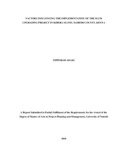| dc.description.abstract | Recent developments in the urban population dynamics has led to the development and incessant growth of informal settlements. These informal settlements, popularly known as slums arise as a result of low incomes and inadequate housing provision system for the urban poor. Kibera is one such slum where housing shelters are of low quality characterized by open sewers, contaminated water pipes and without a formal waste management system. The Kenyan government is concerned in upgrading slum settlements to improve the supply and quality of affordable housing for low-income earners, thus the establishment of Kenya Slum Upgrading Programme in 2000 involved in the upgrading process. This study investigated factors influencing implementation of the slums upgrading programmes with specific reference to the Kenya slums upgrading programme in Kibera slums. The objectives were: to assess the urbanization; the community participation; the security of land tenure; and funding, influence the implementation of Kibera slums upgrading programme. The study adopted a descriptive research design, collecting data from a target population comprising of 600 Soweto slum upgrade project beneficiaries from whom a representative sample of 150 beneficiaries was sought, and the KENSUP staff involved in the Soweto project. Self-developed questionnaires were used to collect data from the study sample. Quantitative data was analysed through the statistical tools while qualitative data from open-ended questions was presented through thematic narration with interpretation done in line with literature review. From the data analysis, the study found that the Kibera slum upgrading program implementation has been influenced by project funding, community participation and security of land tenure. It was found that the three factors of project funding, community participation and security of land tenure have a positive impact on project implementation and hence improvement in these factors would lead to improvement in the implementation process. However, the study found no relationship between urbanization and project implementation despite the factor being vital at the project planning and initiation stage prior to the commencement of project implementation. Community participation was found to be a more important factor than funding and land tenure as it had a greater influence on project implementation, highlighting the need for community participation in public projects. The study therefore concludes that project funding, community participation and security of land tenure are the factors that influence slum upgrading project implementation. The study recommends a timelier approach to funding by the project trust, government and donor agencies; more involvement of the beneficiary communities; improvement in land adjudication and security of land tenure so as to improve project implementation. The study also suggests further research of a similar study in a different geographical setting, and socio-demographics to optimize the understanding of factors influencing project implementation in slum upgrading projects. Study on factors influencing public project implementation should also be done in other sectors such as agriculture to understand other factors present. | en_US |

